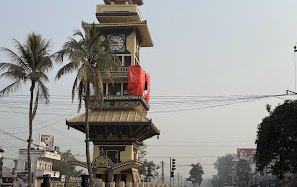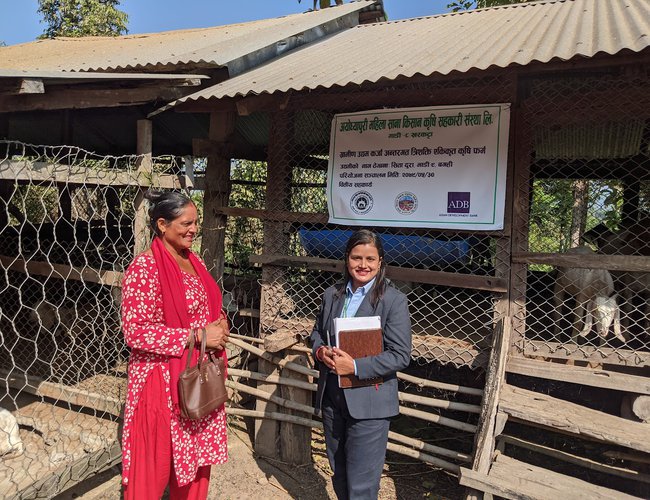
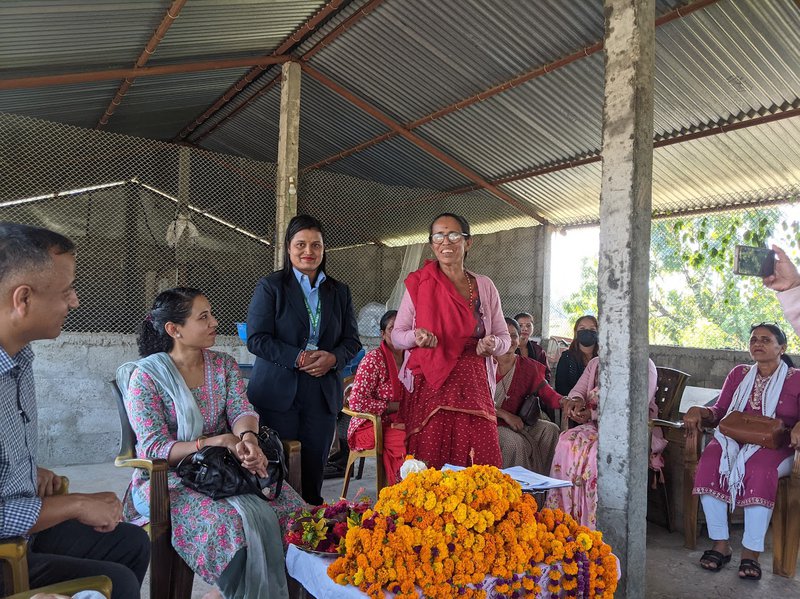
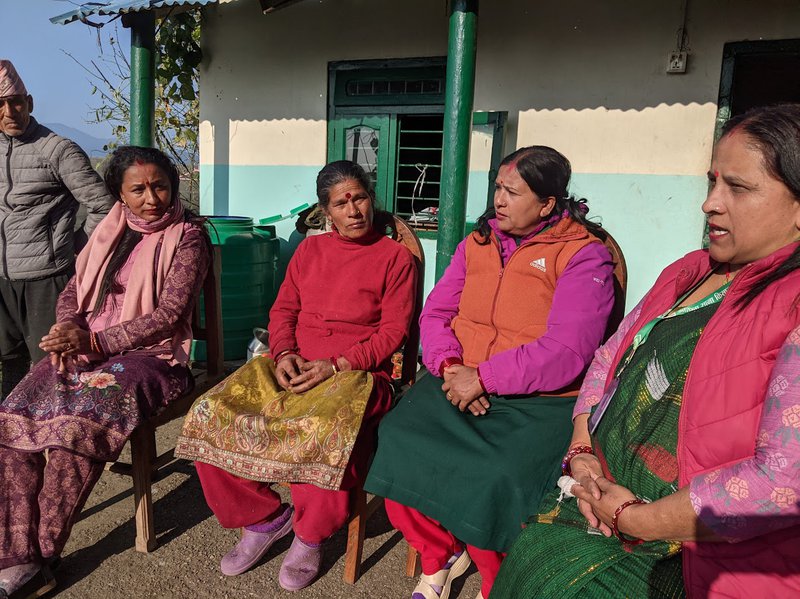
With a strong commitment, determination, and essential financial backing, small-scale women farmers can significantly enhance the nation’s agricultural output and the income of farming households.
The Small Farmers Agriculture Cooperatives Ltd (SFACL), which is led and managed by women and provides loans to female farmers across various regions of Nepal, has played a crucial role in shifting the country’s agricultural practices from subsistence to commercial farming.
Although these cooperatives have existed for many years, offering limited financial assistance to disadvantaged small farmers, including women, the ADB-funded REFP has expedited this transformation by increasing loan thresholds and enhancing the capabilities of the cooperatives and their managers.
Pipla Bhandari, a 62-year-old resident of Madi Municipality Ward No. 9 in Chitwan district, has established herself as a model farmer, generating fish sales exceeding Rs. 10 million ($60,000) annually, with a net profit of Rs. 5 million ($30,000).
Bhandari cultivates fish on her 11 bigha (2.76 hectares) of land, responding to the market demand in Nepal. "I do not have concerns regarding the market or pricing. I supply fish when demand peaks," stated Bhandari, who has benefited from a concessional loan of Rs. 5 million ($30,000) through the REFP project via Ayodhyapuri Women Small Farmers Agriculture Cooperatives Ltd. "I have already repaid Rs. 1.8 million to the cooperatives and will continue to make payments according to the agreed schedule."
In a similar vein, Sita Dura, a 45-year-old farmer from marginalized communities residing in Bagai, Ward No. 8 of Madi Municipality, exemplifies how access to financial resources can empower women to become entrepreneurs.
Despite living in a remote village in Chitwan district, located 50 kilometers southeast of Bharatpur and adjacent to Chitwan National Park, Dura generates an annual income of approximately Rs. 2 million ($13,000) from her vegetable and goat farming endeavors.
With her substantial income, she has been able to send her two children to Bharatpur for higher education. Since becoming a member of the Ayodhyapuri Women Small Farmers Agriculture Cooperative Ltd nearly eight years ago, Dura has accessed small loans, which do not exceed Rs. 600,000 ($4,500), resulting in a modest income.
The acceleration of income facilitated by loans amounting to Rs. 2.5 million from the REFP has been significant. "The additional investment has increased our annual income," narrated Dura.
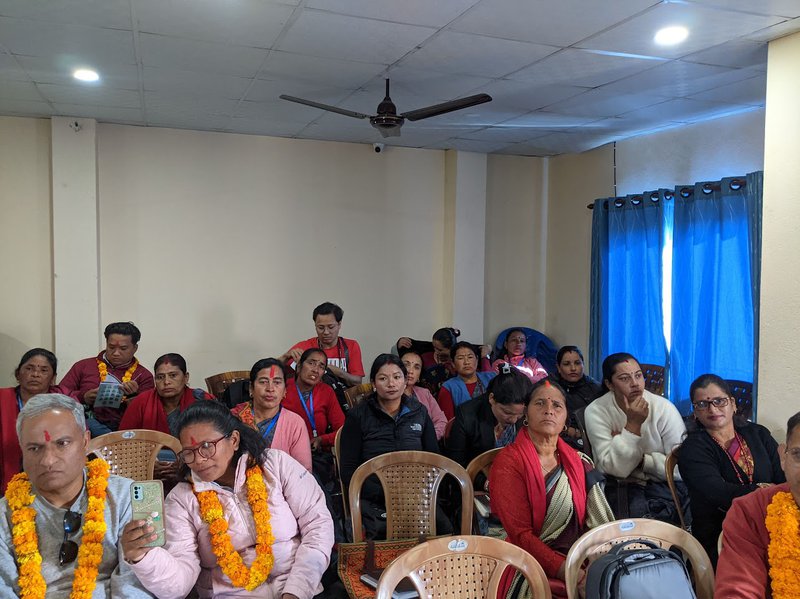
Tika Devi Sarki, a Dalit woman residing in Lahachwok Ward No. 4 of Macchapuchre Rural Municipality of Kaski district, has demonstrated how the additional concessional loan from Lahachowk Small Farmer Agriculture Cooperative Ltd has transformed her status from untouchable to touchable. By selling quality milk to all castes in her village, where the community previously boycotted milk sold by Dalits, Sarki has not only generated income but has also played a crucial role in altering long-standing social practices.
Previously, with a concessional loan not exceeding Rs. 500,000 (approximately US$3,000), Sarki faced challenges in expanding her vegetable and dairy farms. Due to insufficient land to serve as collateral, she was unable to secure further loans from commercial banks, which charge high interest rates of around 13 percent.
The implementation of the REFP through local cooperatives, which has increased the limit for concessional loans to Rs. 5 million, has been a significant advantage for her. By developing a business plan, Sarki successfully applied for and received a concessional loan of Rs. 2 million to expand her business.
An additional investment of two million enables me to expand poultry production, accommodating 2,000 chicks per session. With my son's assistance, we are cultivating vegetables, producing milk, and raising broiler chickens," said Sarki.
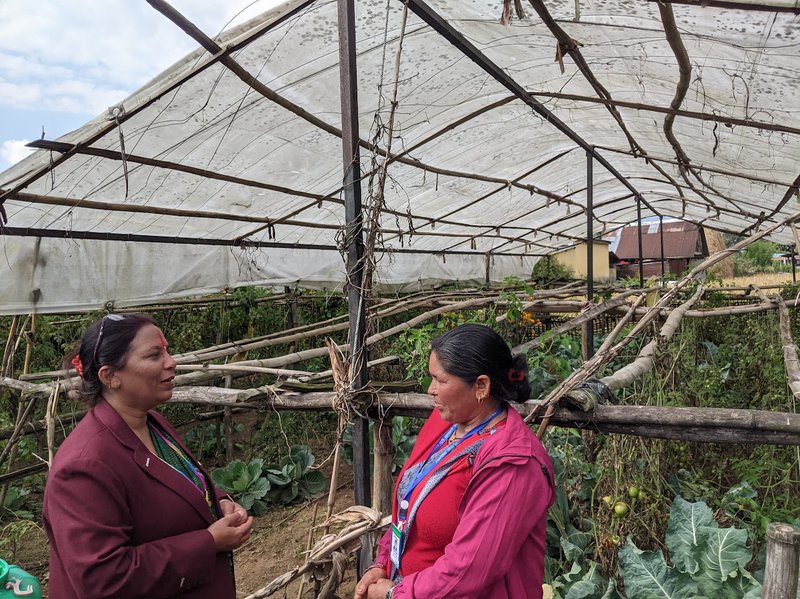
As a single woman, Sarki currently achieves an annual turnover of approximately 2 million, with a net profit nearing 1 million each year. "I have already repaid half of my loan, and we plan to settle the remaining amount this year," she added.
Over the years, improvements in lending and investment capabilities have allowed smallholder farmers like Sarki to transition from small-scale to medium-scale farming.
Adhikari, Dura, and Sarki are among the small farmers operating enterprises supported by the Small Farmers Agriculture Cooperative (SFAC). Thousands of women small farmers have experienced significant changes in their economic status in recent years due to access to concessional loans.
Behind the success of these industrious women farmers are dedicated young and middle-aged women serving as managers and chairpersons of the SFACs.
In addition to enhancing the capabilities of small farmers, the Rural Enterprise Financing Program (REFP) also strengthens the skills of managers and staff at SFACs and Sana Kisan Bikas Laghubitta Bittiyasanstha Ltd.(SKBBL), formerly known as Sana Kisan Bikas Bank Ltd (SKBL), with a particular focus on women. This aspect is a crucial element contributing to the project's success.
Laxmi Acharya, the manager of Lahachwok Small Farmer Agriculture Cooperative Ltd in Kaski, Indra Thapa, the manager of Women Small Farmers Agriculture Cooperative Ltd in Srangkot, Laxmi Kadel, the manager of Gardi Women Small Farmers Agriculture Cooperatives Ltd, Laxmi Lamichhane, the manager of Ayodhyapuri Women Small Farmers Agriculture Cooperatives, and Meghi Kumari Mahato, the manager of Baghauda Women Small Farmers Agriculture Cooperatives in Baghauda, Chitwan, have set a commendable example in promoting small women farmers.
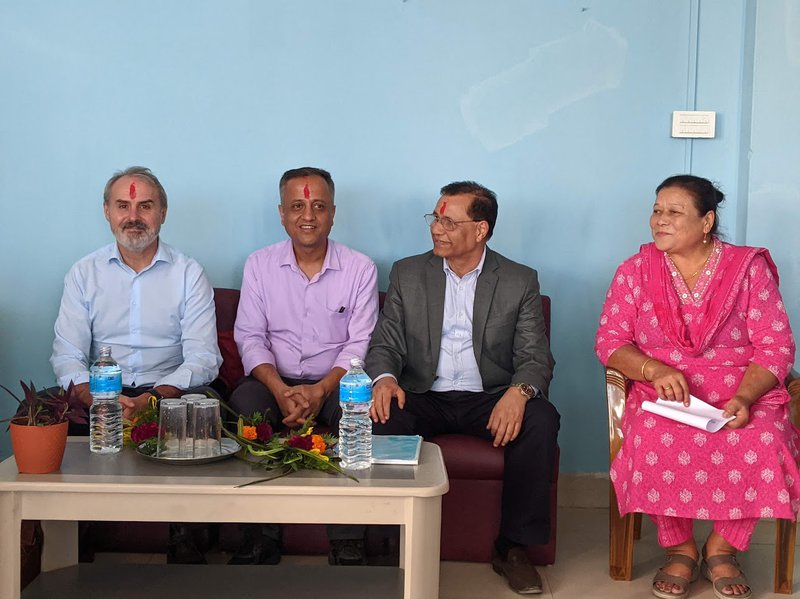
In addition, Purna Maya Adhikari, the manager of Small Farmer Agriculture Cooperatives Ltd, has made significant investments in a rice mill and oil seed meals in Kathaiya. "We have allocated funds based on a comprehensive business plan and risk assessment. Over the past two years, the mill has enabled small farmers to sell their agricultural products at fair prices," Adhikari stated.
For Laxmi Lamichhane, the manager of Ayodhyapuri Women Small Farmers Agriculture Cooperatives Ltd in Chitwan, the project has provided her with essential skills, including the development of business plans, risk assessments, and various aspects of financial literacy.
Beginning her daily duties early in the morning and continuing until late evening, Lamichhane visits women farmers, attends meetings, and offers consultations and advice. She also regularly visits the homes of borrowing farmers to collect interest payments.
Lamichhane stated, "For an extended period, I have been approving loans for farmers without possessing sufficient knowledge of financial literacy. However, I have acquired skills in risk assessment and business plan development. These competencies have significantly contributed to enhancing our institutional capacity." He regularly visits the households of members to monitor the status of businesses funded through concessional loans, noting, "The larger the loan, the greater the risk and opportunity."
Following her participation in training associated with the new project, Laxmi Acharya, the manager of Lahachwok Small Farmers Agriculture Cooperatives Ltd, has begun to observe a comprehensive evaluation of risk, income, and collateral within the system. "Our lending process has become more systematic and member-oriented. In the past, we would lend up to Rs.500,000 to member farmers with relatively low risk. Now that we are extending loans in the seven-figure range, we require enhanced skills and capacity," Acharya explained.
Women managers of Small Farmers Agriculture Cooperatives Ltd (SFACLs), who balance household responsibilities while raising children, are actively working across the nation to improve the livelihoods of smallholder women farmers by boosting productivity.
As part of the REFP initiative, the project has successfully increased the incomes of smallholder farmers by involving them in enterprises and commercial agricultural activities.
ADB Country Director On Project
Arnauld Cauchois, the country director of the Asian Development Bank Resident Mission, said, “this year, we’ve chosen the Rural Enterprise Financing Project as the focus of the press tour. This project is an important initiative aimed at supporting agriculture-based enterprises that operate throughout the country. By providing financing to these enterprises along with technical assistance, the project contributes to empowering rural communities and strengthening Nepal’s agricultural sector—a critical part of the economy contributing about 26% to GDP.”
He said that the project is helping small farmers and rural enterprises transition from subsistence farming to value-added enterprises by providing targeted financial support and technical assistance.
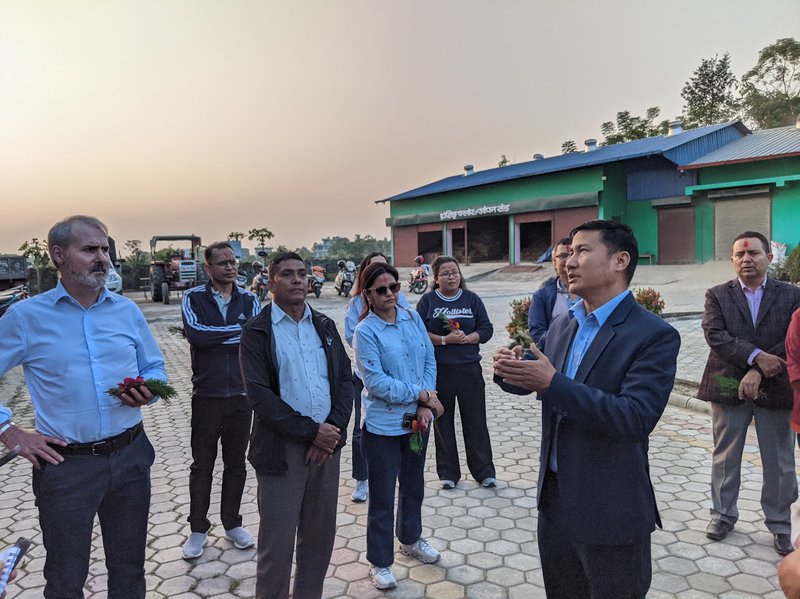
“We’re particularly proud of the project’s strong focus on gender equity. A key aspect of the project is empowering enterprises led by women and marginalized groups through access to finance, technical training, and leadership roles, allowing them to contribute to rural economic transformation,” said Arnauld Cauchois, country director of ADB, who joined the first leg of the press tour in Chitwan.”
Women At The Front
In the districts of Kaski and Chitwan, enterprises operated by small farmers, especially women, are involved in the production, processing, and marketing of agricultural goods, including meals, livestock, and vegetable farming. Additionally, male-operated farms and enterprises within the project are promoting gender equality by ensuring that women receive equal shares and economic benefits.
Sanvi Bahu Uddeshiya Krishi Farm, located in Majhthana in Pokhara Metropolitan City, Kaski District and managed by Breindra Thapa Magar, a returning migrant worker, is leading the way in pig production in the area.
Thapa has invested Rs. 3 million into the farm and has obtained concessional loans from the project to expand his pig population. With the support of his wife, Thapa dedicates time to visiting the market to sell his pigs and piglets at higher prices.
Both the husband and wife contribute equally to their work. The additional loan received from REFP has significantly increased the production capacity of my farms, necessitating the hiring of more laborers. “My wife is assisting me alongside three other employees. “
Returnee Migrants
In a similar vein, Chandra Kanta Ghimire, a returnee migrant from Saudi Arabia, operates the Mina Krishi Tatha Pashupaln Farm, where he sells 100 liters of milk daily in the local market, generating an income of Rs. 10,000.00 each day.
With a loan from Small Farmers Agriculture Cooperatives Ltd Majthahana Kaski, Ghimire constructed a shed and acquired 13 high-bred buffaloes. While Ghimire focuses on farm operations, his wife manages the care of the buffaloes. "My wife Meena Kumar Ghimire’s contribution surpasses my own," Ghimire remarked.
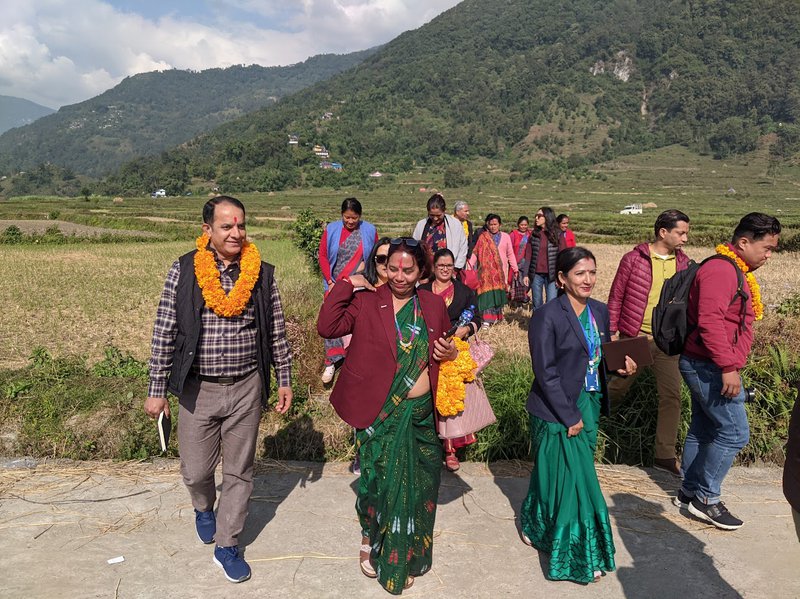
Twenty-five-year-old Bhojraj Tamang and his wife Shanti Bhattarai Tamang, who participated in a learn and earn program in Israel from 2018 to 2019, have successfully transformed a barren hilly area at the summit of Lahachwok in Macchapurchre Rural Municipality into a hub for off-season vegetables. Utilizing 133 Ropani (6 hectares) of land, with 10 Ropanis personally owned and the remainder rented, the couple has effectively applied the skills and knowledge gained in Israel, supported by a concessional loan from ADB’s REFP.
Bhojraj Tamang has leveraged the skills and knowledge he gained in Israel, along with a soft loan of Rs. 3.2 million from Small Farmers Agriculture Cooperative Ltd Lahachwok, to achieve an annual income of approximately Rs. 2 million. By raising 58 high-breed goats, he demonstrates significant economic potential in commercial agriculture. "During the off-season, I have been earning around Rs. 1.5 million from selling mustard vegetables, benefiting from the elevation of my land. The supply of green vegetables commands a price that is five times higher," Tamang remarked, noting that he married his wife after meeting her during his training in Israel.
Shanti Bhattarai Tamang, his wife from Rupanedhi, southern plain, has been actively involved in the farming business alongside her husband, and they have a two-year-old son.
Ganga Maya Timilsina, a resident of Sarangkot in Pokhara Metropolitan City, has experienced a remarkable transformation in her life. Once a struggling small farmer, she now generates an annual income of around Rs. 1.8 million through the sale of vegetables and goats, thanks to her connection to the Pokhara Market via a well-maintained road.
With a loan of Rs. 2 million from the REFP, Timilsina has diversified her agricultural production, cultivating various types of vegetables. Last year, she sold 35 quintals of produce, including tomatoes, mustard vegetables, cauliflower, and cabbage.
Living with her husband and son, Timilsina invested approximately Rs. 2 million to send her son to Canada. "Through goat and vegetable farming, I am repaying my loan and interest to Women Small Farmer Cooperatives Ltd Sarangkot," Timilsina stated.
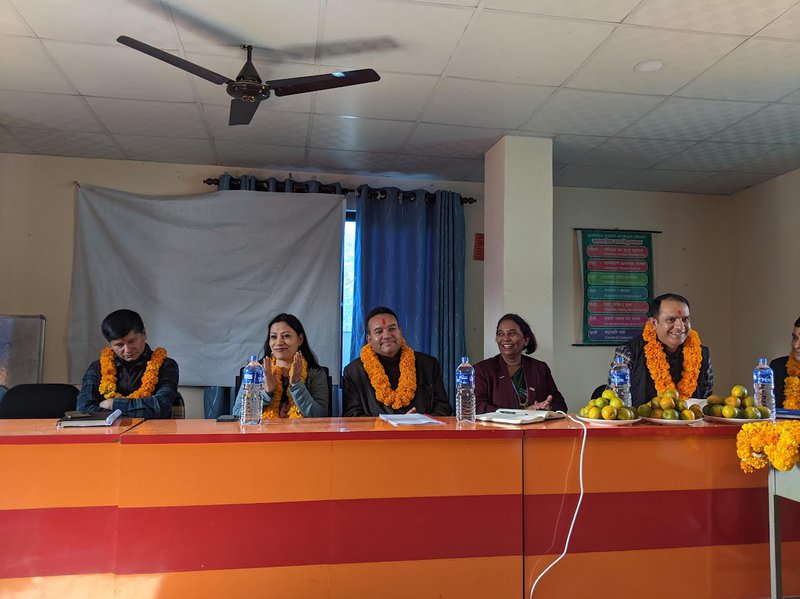
By the conclusion of June 2024, a total of 1,798 farmers have benefited from the project scheme, receiving an aggregate amount of Rs. 3,911,995,000. Among these beneficiaries, 1,766 farmers have obtained individual enterprise loans amounting to Rs. 3,480,795.00, while Rs. 431,200,000 has been allocated under the collective enterprise loan initiative.
Over the past four years, the project has actively promoted and financed commercial agribusiness ventures that are collectively owned by small farmers, as well as individual small enterprises, through Sana Kisan Bikas Laghubitta Bittiyasanstha Ltd. (SKBBL), previously known as the Small Farmers Development Bank (SFDB). This apex development bank is owned by Small Farmers Agriculture Cooperatives (SFACs). The Rural Enterprise Financing Project (REFP) has played a crucial role in enhancing the capacity of small farmers and fortifying the human and institutional capabilities of SFACs.
According to Dr. Shiva Ram Prasad Koirala, Chief Executive Officer, "In accordance with the agreement, SKBBL provides wholesale credit to SFACs, which in turn relend to their small farmer members. Under this project, SFACs distribute the loan proceeds to both collective and individual enterprises of their members."
Enhanced Capacity
The project has also illustrated that enhanced productivity and substantial returns in the agricultural sector can significantly alleviate poverty and create employment opportunities in rural Nepal. With increased agricultural incomes, smallholders are able to expand their landholdings through leasing and adopt technology for large-scale production.
The objective is to transition the existing subsistence-based agricultural practices into commercially viable activities that add value. This transformation will necessitate external assistance, which may include capacity building, business facilitation, financing, and potentially risk-sharing mechanisms such as guarantees. The initiative aims to enhance the commercialization of smallholder farmers through financial intermediation and support for value chain development.
"ADB has been actively involved in this project to enhance the livelihoods and boost the incomes of small farmers in Nepal by assisting them in financing, developing, and managing rural enterprises," stated Anjan Panday, Senior Program Officer at the ADB Residence Mission.
"SKBBL focuses on empowering women smallholder farmers and women managers to achieve optimal productivity," remarked Dr. Nav Raj Simkhada, Deputy CEO of SKBBL.
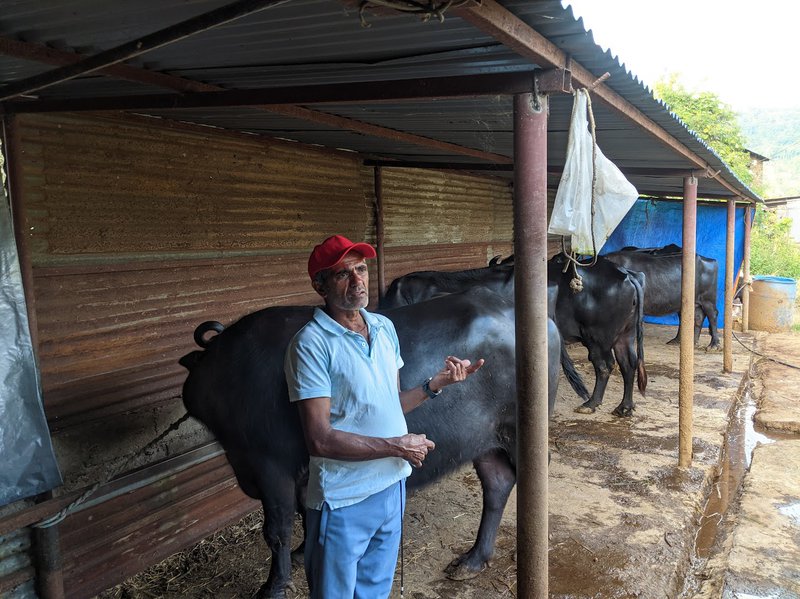
The enterprises promoted by SFAC or its members are expected to engage in the production, processing, and marketing of agricultural goods. The project has crafted loan products aimed at fostering entrepreneurship among smallholder farmers involved in diverse agricultural activities. These loans will be accessible through SFACs to their members.
Since its implementation in 2020, the REFP, with a budget of 50 million dollars, has significantly supported the commercialization of agriculture. The beneficiaries of this project are smallholder farmers who are members of SFACs and can access microcredit facilities provided by these organizations. The project will also offer technical assistance to smallholder farmers for entrepreneurship development, enabling them to initiate or enhance small enterprises with a credit facility of up to NPR 5 million.
The initiative also facilitates the establishment of collective enterprises endorsed by SFAC and/or its members, offering credit facilities of up to NPR 20 million. Women farmers such as Dura, Adhikari, and Sarki in Ayodhyapuri Chitwan and Lahachwok, Kaski are revolutionizing agriculture through remarkable resilience and ingenuity. They skillfully manage credit and nurture their crops, demonstrating leadership and enhancing their communities on a daily basis.
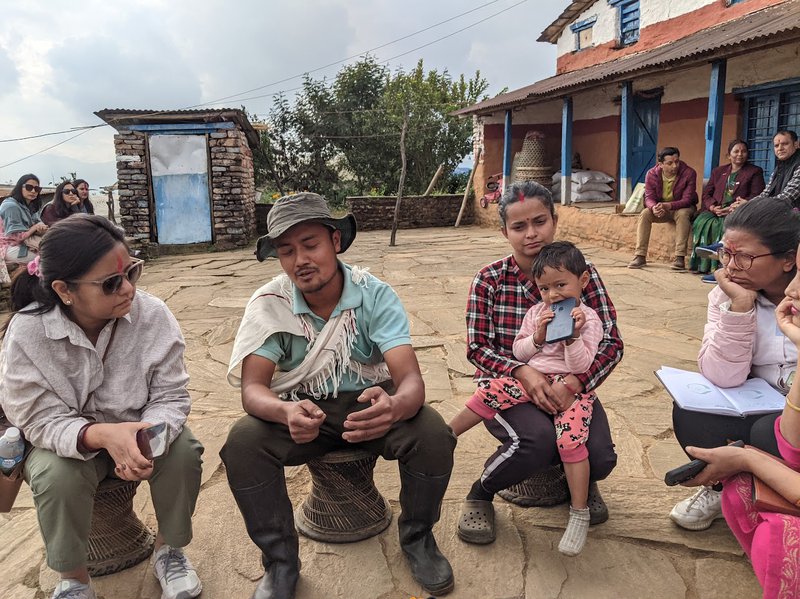
In enterprises predominantly led by men, women play a pivotal role, collaborating effectively. In every instance, there exists a profound sense of partnership between spouses. Additionally, women leaders such as the three Laxmi representatives from Chitwan and one from Kaski, along with Megha Kumar Mahato from Chitwan, have illustrated how empowered leadership can drive significant change.
Neelima Nakarmi, an economic analyst at the ADB Resident Mission, emphasized that women are essential contributors to enhancing the overall productivity of the agricultural sector. The Asian Development Bank not only provides loans for infrastructure projects such as roads, transmission lines, and hydropower but also extends grants and loans to support the agricultural sector in Nepal.
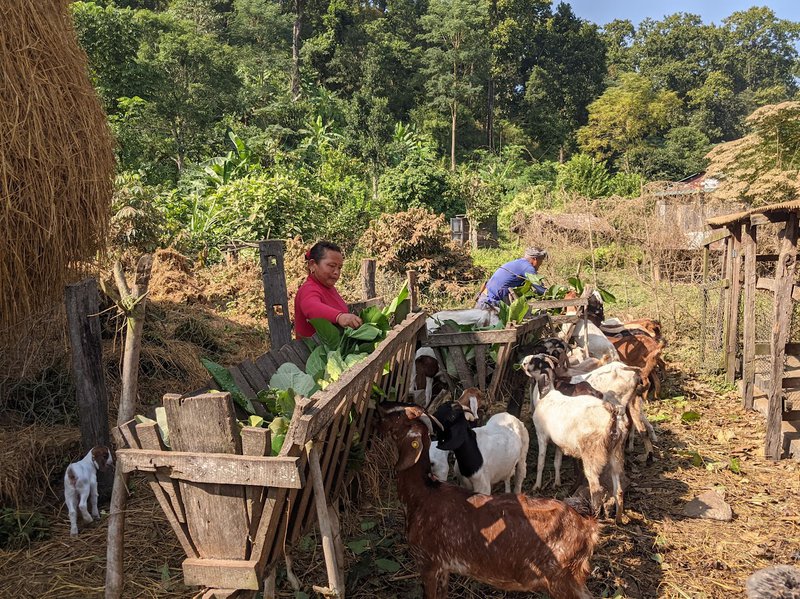
As Nepal observes 16 Days of Activism with a focus on Gender, Disability, and Social Inclusion, REFP has showcased how the strength of women in advocating for women's empowerment is transforming agriculture from a subsistence model to a commercial one.
The Asian Development Bank (ADB) assisted in the development of the Twenty-Year Agriculture Perspective Plan (APP), which serves as the inaugural strategic plan alongside the ongoing Agriculture Development Strategy. These documents are essential for the transformation of Nepal's subsistence agriculture systems. Additionally, the ADB has supported numerous other initiatives aimed at modernizing the agricultural sector in Nepal.
In contrast to previous grant projects, the concessional loan-based REFP appears to be more effective in fostering ownership among small farmers.

Keshab Poudel
Poudel is the editor of New Spotlight Magazine.
- ERC Nepal Is Focused On Expanding Distribution And Transmission To The Private Sector: ERC Chair Dr. Dhital
- Jul 06, 2025
- FOURTH PROFESSOR Y.N. KHANAL LECTURE: Nepal-China Relations
- Jun 23, 2025
- Colonel JP CROSS: Centenary Birthday
- Jun 23, 2025
- BEEN: Retrofitted For Green
- May 28, 2025
- GGGI has been promoting green growth in Nepal for a decade: Dr. Malle Fofana
- May 21, 2025








